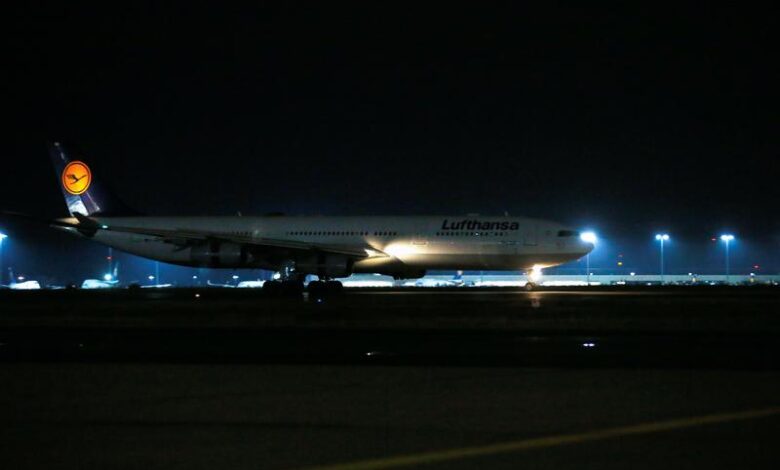A Lufthansa flight carrying some 130 evacuees from the Afghan capital Kabul landed in Frankfurt early on Wednesday as the country’s effort to repatriate its countrymen after the Taliban takeover finally gained momentum.
The Airbus 340 jet chartered by the German Government had taken off from the Uzbek capital Tashkent, where an evacuation hub has been set up.
In consultation with the Berlin Government, Lufthansa would also offer evacuation flights from Doha in Qatar and possibly from other countries bordering Afghanistan after a sluggish start, a government spokesperson said.
Yet unknown number of flights were planned for the next few days.
Germany’s evacuation got off to a slow start on Monday.
The first Germany military plane had brought just seven people out of Afghanistan after dropping off Bundeswehr paratroopers at the Kabul airport, with the small number of evacuees prompting reactions of dismay online.
Hours later, a second evacuation plane carried 129 people from 15 countries to Tashkent.
By late Tuesday a third aircraft from Kabul with 139 on board had landed in Tashkent, ahead of onward transport to Germany with Lufthansa.
Four more evacuation flights were planned for Wednesday to compensate for a flight that was not carried out the day before.
According to the Defence Ministry in Berlin, more than 260 people have been evacuated from Afghanistan so far.
German President Frank-Walter Steinmeier demanded that Germany do everything possible to bring its own compatriots and the Afghans who had stood by them for years to safety.
Steinmeier also called for ways to help those threatened by violence or death in Afghanistan, including many courageous women.
He and German Chancellor Angela Merkel both acknowledged that the West had failed to build a sustainable political system in Afghanistan.
“We are experiencing a human tragedy these days for which we share responsibility, and a political caesura that will shake us and change the world,’’ Steinmeier said.
As leaders predicted refugees would flee from Afghanistan, fearing repression or reprisals under the militant Islamists.
Merkel said the first step would be to consider the safest options in neighbouring countries for those fleeing, before discussing the number of refugees countries should take in.
“Then, in a second step, we can think about whether people who are particularly affected should come to Europe and to European countries in a controlled and supported manner,’’ Merkel said.
She discussed the situation with UN Commissioner for Refugees Filippo Grandi, French President Emmanuel Macron, British Prime Minister Boris Johnson and Italian Prime Minister Mario Draghi.
All agreed to work closely to evacuate European citizens and local forces.
In the evening, German Foreign Minister Heiko Maas said around 180 people were waiting to fly out of Kabul airport but that the Taliban were only allowing foreign nationals to reach the airport, raising questions about how Afghans would be able to get out of the country.
German ambassador Markus Potzel flew to Doha to hold talks to negotiate the safe departure of local staff that had supported German efforts in the country.
There was widespread criticism that Germany’s first plane to leave Kabul held only seven passengers, but the government said it had no other choice.
A German Foreign Ministry spokesman blamed the chaotic circumstances at the airport and regular exchanges of fire at the access point.
The aircraft had to leave the airport after only a short time on the ground, he said.
Before the military transport efforts started on Monday, 40 German citizens had been flown out of Kabul on a U.S. plane on Sunday and landed in Berlin on Tuesday.
Meanwhile Development Minister Gerd Mueller announced that Germany would end development aid to Afghanistan.
He also said that all German and international employees of the German Society for International Cooperation (GIZ), which was responsible for official development assistance, had safely left the country.
Afghanistan has so far been the number one recipient of German development aid, with 250 million euros (294 million dollars) budgeted for this year.
This was in addition to funds from other ministries, for example for humanitarian aid or police training. In total, Germany had pledged 430 million euros for this year.
In contrast, the EU which according to its own figures has provided 4 billion euros in aid over the past two decades pledged to uphold its assistance to Afghanistan.
“The EU is committed to continuing to provide aid to those in critical need,’’ European Commissioner for Crisis Management Janez Lenarcic tweeted on Tuesday.
The SPD’s candidate to be the next German chancellor, Olaf Scholz, said the evacuation from Afghanistan was the most important task facing the German government at the moment.
The Bundestag’s Committee on Internal Affairs was set to hold a special session about Afghanistan on Thursday.
Meetings of the committees primarily responsible for foreign affairs and defence have already been scheduled for Wednesday.

 Latest4 days ago
Latest4 days ago
 Trends5 days ago
Trends5 days ago
 Business1 week ago
Business1 week ago
 Football7 days ago
Football7 days ago
 Health6 days ago
Health6 days ago
 Football6 days ago
Football6 days ago
 Featured1 week ago
Featured1 week ago
 Business7 days ago
Business7 days ago

